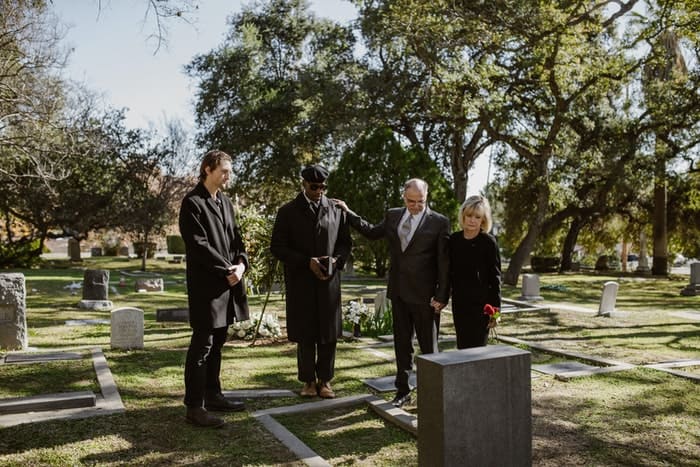

Funeral Wishes
Planning Your Funeral Wishes
Many people nowadays get the wrong impression of planning your own funeral. They believe it is a highly stressful and unsettling experience. We are here to relieve those worries by guiding you through every step of the funeral process. By using our ‘How to’ guides below, you will be able to plan your own funeral with complete ease. All the information you need, detailed in one place.
What are funeral wishes?
Funeral wishes are your final life decisions. They can be stipulated in your will or with your funeral plan provider. Upon death, your executor will take your final wishes into careful consideration. This will assist them when making decisions towards your care and funeral service. You can advise on how you wish your body to prepared and cared for prior to the funeral. As well as guide your family through how and where you would like your funeral service to be carried out.
Do not worry if you have decided to change your mind about any of your final wishes. You will always be able to update and amend any of your wishes, at any time. Whether you’ve found a more meaningful piece of entrance music or you’ve decided to change a piece of jewelry to wear. The freedom is yours to change your decisions as many times as you like. Present your funeral with individuality and personality and celebrate your life, chosen your way.

When should I choose my funeral wishes?
It is highly beneficial to decide your funeral wishes in advance of your death. You will be able to leave your family time to grieve and celebrate your life, but in your way. Taking out a funeral plan and outlining your final funeral wishes will protect your loved ones from making any hard decisions. This will further support your family by allowing them time to express their emotions and pay their respects.
We highly recommend talking to your family and loved ones about your funeral wishes. This way they will be able to communicate effectively with you by asking questions or raising any concerns. It is important that your family is united during the grieving process, and not in constant conflict with each another. Talking through your choices and your reasons for them in advance will make all the difference when the time comes.
Are funeral wishes the same as end of life plans?
No, they are two different ways of informing your loved ones of final decisions made. Funeral wishes are usually final decisions made in the event of your death. End of life plans are decisions made in the event of you suffering a critical illness. This covers any period leading up to your death or during a period where you are unable to make legal decisions.
Funeral wishes allow you to express your final decisions on how your body is looked after and how your funeral is conducted. You can specify flower arrangements and the type of vehicle used to transport you from the hospital to funeral directors and service. You are able to note any specific readings or music you want at your funeral, including what clothes and jewelry you wear. These decisions will then be closely kept in your executors mind after your death and throughout your burial or cremation.
End of life planning allows you to appoint someone as a power of attorney to deal with your personal and financial affairs. They will be able to represent you and act on your behalf during any legal matters. People usually appoint a power of attorney when they no longer wish to or are unable to make decisions for themselves. You my also wish to include a ‘Do Not Resuscitate note’. This advises your hospital, hospice or medical care team that you do not want CPR if you go into cardiac arrest.
Can I write my funeral wishes in my will?
Yes, you can write your funeral wishes into your will but these are usually not read until after the funeral or legally binding. As you do not want your wishes to be missed, we recommend you keeping them somewhere readily available to your family. You can even add your final wishes into your funeral plan documents. This will give you peace of mind in knowing that you have communicated and expressed your final wishes and decisions.
Most families will want to arrange certain aspects of your funeral to pay their respects or to healthily express their emotions. This could be from choosing the photos to accompany your casket or your hearse flower arrangements. It is crucial that you openly discuss your funeral wishes, in detail with your family prior to your death. This way your family will have the opportunity to reassure you that your wishes will be honored.
Paying for your funeral in advance is the best way to ensure your funeral is carried out according to your wishes. Nowadays you can add your funeral wishes onto your funeral plan documents and provide copies of these to your family. It will enable the executor to make the right decisions when going through your funeral arrangements. They will be made aware of your final wishes and will respect what is important to you.

Do you have to go into detail when writing your final wishes?
It is important that you choose what is right and meaningful to you when writing down your funeral wishes. You can add in as much or as little detail as you like. We recommend adding as much detail as you possibly can to ensure there is no confusion to your requirements. You will need to ensure your notes are precise and clearly laid out so others can understand them easily.
We advise writing down any particular ways in which you want your body to be prepared for your funeral. You may wish to be bathed and disinfected but do not want to be embalmed. Make sure you detail how or where you want your body to be buried, or how your ashes are scattered. Express whether you are happy for viewings and whether you wish to have an open or closed casket and certain services.
If have a funeral wish that you want to specify certain elements of, you could detail these as follows:
- I wish to have my 50th birthday picture displayed next to my casket during the funeral service. This is the photo where I am wearing my favourite football shirt with a pint of Guinness in hand. This photo is currently hanging in the hallway of my home.
- I wish to have the following verses read out from the bible during my funeral service - John 3:16 & John 14:1-3.
- I wish to be buried on top of my husband’s final resting place in the public cemetery in Worcester, UK.
- I would like to be cremated in my silver nightdress with my white gold engagement ring, wedding band and pearl silver necklace.
Adding as much detail into your wishes supports the executor in perfecting your funeral arrangements. You can depict which milestones or achievements you are referring to in your wishes. As well as specify certain poems, music or religious passages you want performed or played at your funeral. You may have a requirement for a certain person to read your eulogy, or a specific route you want the hearse to take. Make your funeral wishes known and have comfort in knowing that your funeral will be presented, your way.
What don’t I need to include in my funeral wishes?
Many things are naturally taken care when you die, by close friends, family or governmental services. This would mainly include any personal or financial affairs and any preparation of legal documentation. This means that you will not have to add these types of decisions into your funeral wishes.
Usually your loved ones will organise and complete any legally permitted documents or lawfully binding contracts. These could be legally registering your death, settling any utility bills or council tax payments, and even your mortgage. They will also notify any organisation of your death if you have an active subscription, pension or benefit service. Your executor or immediate family will have to ensure they complete any legal documents within the laws specific timeframe.
Your friends or family will also be able to take care of the smaller things. They will be able to contact Royal Mail to ensure any of your future post is forwarded on to an alternative address. And they can even arrange to publish an obituary in a local newspaper to publicly announce your death. Many family members or close friends will naturally ensure these affairs are taken care of for you. We always recommend letting your family know whether you have any funeral wishes. They will have the opportunity to understand and talk through your choices. Usually family and close friends will feel morally obliged to respect, appreciate and fulfill a loved ones final wishes.
How do I keep my funeral cost to a minimum?
Some families may think that having a cheaper funeral is a sign of disrespect to the deceased. Nowadays, many of us would prefer a low-cost funeral to help save our loved ones money. There are certain ways in which you can reduce the overall cost of your funeral service. You can do this by any of the following:
Having a direct cremation
Direct cremations are much cheaper than having a standard cremation or a burial. They include doctor’s fees and preparation of any medical documents. Care to the deceased prior to funeral along with a simple coffin. The deceased will also be covered for collection and transportation to the funeral home and to the funeral service. With a direct cremation you essentially save money from having to pay for a funeral director. Your family would usually organise the funeral instead of going through the services of a funeral director. There will be no need to organise a procession or a minster to attend the service and you will not need to choose any pallbearers. It is important to know that with a direct cremation, there is usually no transport to take your family to and from the service. The average cost of a burial is approximately £4,000, whilst the average cost of a cremation is approximately £3,000. Saving money on additional funeral director costs could save you in excess of £1,500.
By having a natural or woodland burial
If you’d prefer to be buried instead of cremated, you could consider a natural burial instead of a traditional burial. Traditional burials have a lasting impact on the environment whilst natural burials are more eco-friendly. Natural burial plots are cheaper than cemetery plots as they are based on private land and are permanently owned. Traditional burials are based on land owned by the local council and can only be leased for a certain number of years. Natural, woodland or green burials are usually £2,000 to £3,000, whilst traditional burials are priced at £4,000 to £6,000. As these types of burials prohibit the use of embalming, you can also save approximately £130.00 on preservation costs.
Adjusting the type of material you use for your coffin
Finding a cheaper coffin or casket is the most common way to save money when planning a funeral. There are many ways to find a cheaper alternative without compromising quality. Nowadays, many people choose to have a basic coffin that is made out of cardboard, wicker or oak veneer. These are usually priced between £200 and £500. If you choose to be buried without being placed in a coffin, you can request to be buried in a shroud. A shroud is a long piece of cloth wrapped around your body and can be made from cotton, linen, hemp, silk and flax. Typical prices for a shroud are between £50 and £150. High-end coffins are usually made out of mahogany, solid oak, pine and redwood and are a lot more expensive. In comparison to simple coffin, they are usually priced between £650 and £1,200. If you choose to have a basic coffin you could save on average between £350 and £800. Some people also prefer to take environmental factors into consideration when choosing the right type of coffin. They may consider how long it takes for the casket material to decompose. Or whether the materials would produce high-levels of carbon emissions during the cremation process. On average, it takes 3 months for a cardboard coffin to decompose, compared to that of mahogany, which can take hundreds of years. Cardboard coffins also produce low carbon emissions and burn quicker during cremation.

Consider not being embalmed
Embalming is a scientific way of preserving your body by stalling the natural decomposition process. It is not a legal requirement for your body to be embalmed after death. Today, many people choose to be embalmed if they are being viewed before the funeral or have an open casket. It is also widely used by medical professionals to ensure the body is preserved before being able to conduct a post-mortem. Embalming restores the deceased’s natural appearance and enhances the impression of the deceased being in a peaceful sleep. This will allow your friends and family more time to be able to visit your body during viewings or ceremonies. Around 55% of people have some form of embalming and this figure is increasing constantly due to delays in funeral arrangements. Choosing not to be embalmed can save on average between £70 and £200. Whilst embalming has many benefits, it also has a long-lasting impact on the environment. Burials generally have a higher carbon footprint compared to cremations. But cremations also use a high amount of fuel to assist in converting the body to ashes. Chemicals used in embalming also filter into the soil during decomposition and have a detrimental effect on animals, plant life and groundwater. Both cremations and burials account for millions of tons of carbon dioxide released into the atmosphere every year.
Adjust the type of memorial you have
You can save money on your memorial by adjusting or tweaking a few different elements that are applied to your memorial. You can do this by using a different type of material for your headstone/ plaque such as granite, metal, wood or plastic. You can also adjust the size or shape of your headstone or perhaps opt to have a flat grave marker. Gravestones or markers usually cost between £500 and £1,200 prior to engraving. You can also save a lot of money by minimalising the amount of engravings on your headstone/ plaque. Nowadays, many stone carvers, engravers or stonemasons charge per symbol or per letter. On average the cost for engraving a single symbol or a single letter is between £1.00 and £4.00. Adding ceramic photos or engraved pictures are usually priced between £40 and £70. The overall cost of engraving solely depends on the amount and size of lettering. As well as the method used to engrave the headstone/ plaque. We highly recommend that you research and shop around to find the best stonemason to fit your memorial requirements. Many engravers will include a certain amount of free engraved letters if the headstone is purchased with them directly.
Minimalise or replace flower arrangements
It is becoming increasingly popular for people to want to save money on their funeral flowers. Many people prefer to find alternative, more productive ways of respecting the deceased by donating to charities. Alternative arrangements are often sought when the deceased is due to be cremated, as the flowers won’t be put on display. Whilst, some people find reassurance and empathy in seeing floral tributes from people whom perhaps could not make the funeral. If you prefer to send donations to a charity rather than receiving flowers, you can stipulate this in your funeral wishes. Adding them into your funeral plan documents will ensure that your chosen charity will benefit from any donations. Funeral flowers, wreaths and floral tributes are usually priced between £30 and £150. The pricing will depend on the type of flower, the size of the tribute and the design of the arrangement. If you would prefer to have flowers at your funeral, we recommend gathering a number of quotes from various different florists. This way you will ensure you are getting the best deal to suit your funeral budget.

Consider whether you want a hearse
It is important that you arrange some form of transport for your body to be taken to the funeral service or crematorium. Whilst, you legally do not have to use a hearse, we highly recommend this formal way of transporting your body. A hearse is specifically built to carry bodies from funeral homes to funeral services. They can also openly display floral tributes surrounding the coffin or casket, which a van or estate car could not. If you decide that you would prefer to arrange your own transport, you need to ensure the transport is legally suitable. The van or estate car will need to be able to safely carry the dimensions and weight of the coffin. Coffins are usually a maximum of 33 inches wide (84cm), 25 inches high (63cm) and 82 inches long (208cm). You will also need to bear these dimensions in mind when organising who will carry the coffin to and from the transport. You would need a minimum of 4 people to do this safely. Legally, you must also notify the local police that you intend on using your own vehicle to transport the deceased. You will need to give them the details of the route you plan to take so they can advise accordingly. The police will formally notify you of any restrictions and will provide you with any additional or mandatory road safety measures.
Think about who provides the food & drink
There are various ways in which you can save money when planning your wake or memorial service. We recommend reading reviews written by previous customers for all venues and catering companies you may be looking to go with. This way you will have a better picture on their reliability and whether their services are to the standards you require. Nowadays, businesses are more than happy to negotiate costs for their services and can adjust according to your budget. Other ways in which you could cut the cost is to have the memorial service or the wake at your home. You could arrange for a friend or family member to prepare and provide the food for the reception. Or perhaps purchase drinks from a wholesalers or supermarket. We believe speaking with friends and family about these types of arrangements is highly beneficial. They may be able offer guidance/ assistance and may even find comfort in knowing they are able to contribute in someway. Someone may know someone who has a venue or they may know someone who can assist with the catering.

Here to help you plan your perfect send-off
Planning your own funeral and deciding your funeral wishes in advance will ensure you have the perfect send-off, prepared your way. It also guarantees your loved ones will not have to go through any additional stress or financial pressure of arranging your funeral.
We recommend that you research as many funeral options as possible to ensure you are securing your perfect funeral. We advise that you review various funeral homes, funeral directors, venues and services to find the best deals in today’s market.
We give you the freedom to be able to update or amend your funeral arrangements and requirements at anytime you wish. So you will have complete peace of mind in knowing that you’re not tied-down to any of your initial funeral wishes.
Whether you wish to have a budget-friendly or a fancy funeral service. We can guarantee to provide you with the UK’s top-leading funeral plans currently showing in today’s market. Ensure your funeral wishes are incorporated into planning your funeral by taking out a funeral plan with Quote Me Less, today.

Funeral wishes template
Our funeral wishes template will help guide and answer any details your funeral plan provider may ask.






